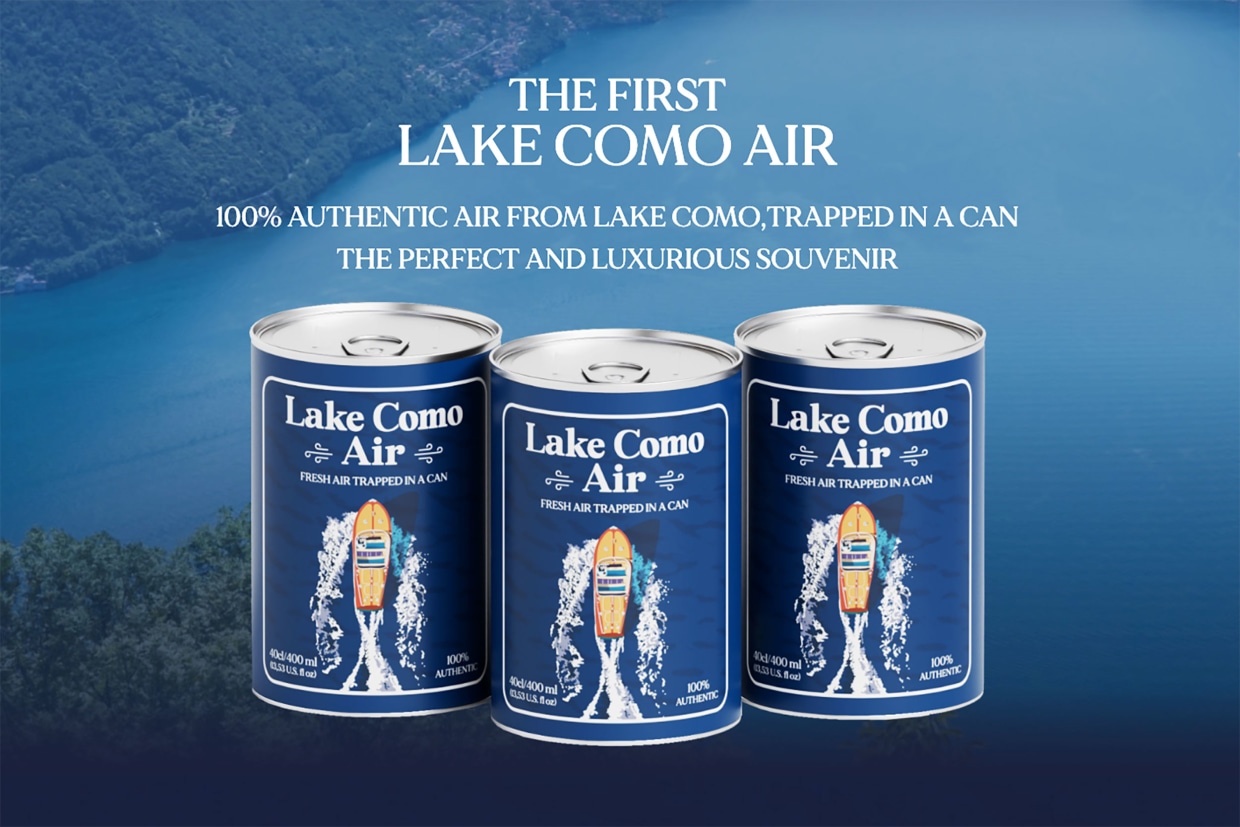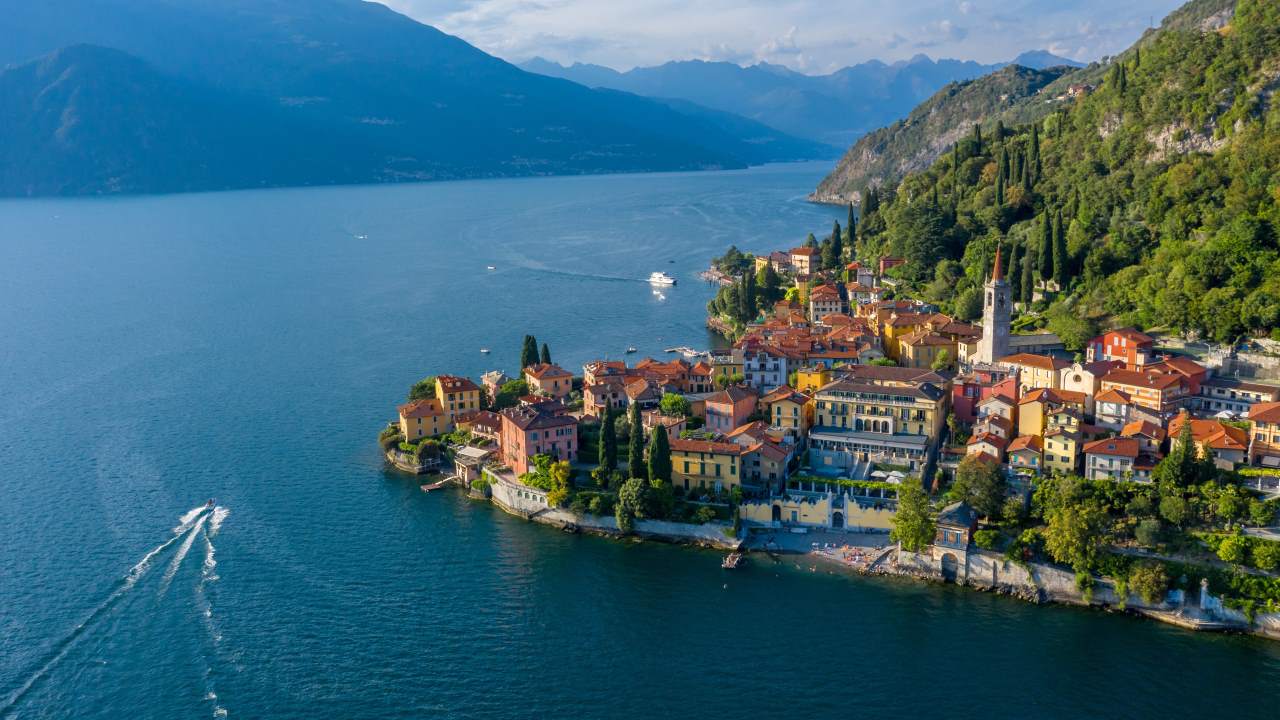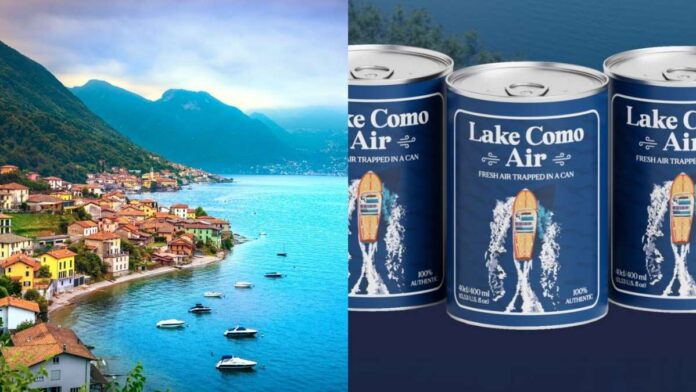Tourists heading to Italy’s iconic Lake Como can now purchase a rather unconventional keepsake—a can of “fresh air” from the region. Priced at $11 per can, this novel souvenir contains 400 milliliters of “100% authentic air” from the famous lakeside destination, aimed at giving visitors a small, portable reminder of their time in one of Italy’s most beloved spots. While some see it as a quirky gift, others are questioning the move, highlighting global warming concerns and the shift in tourism toward unique but intangible souvenirs.
A Breath of Lake Como to Take Home.
The idea behind the air-in-a-can product comes from ItalyComunica, a communications firm determined to give tourists a memorable way to “breathe” in Lake Como’s atmosphere long after they’ve left. The concept is marketed as more than just air; according to Davide Abagnale, a marketing expert who first popularized Lake Como through posters, it’s about providing tourists with a “tangible memory” of their trip.
“It’s a memory that you carry in your heart,” Abagnale explained, emphasizing the sentiment behind the can. For him, the idea is about capturing the essence of Lake Como—its serenity, freshness, and uniqueness—especially for those who travel from around the world to experience it. And once opened, the empty can even has a secondary purpose: it can be repurposed as a pen holder, further encouraging tourists to keep this odd memento within reach, long after their trip is over.

Mixed Reactions: Novelty or Gimmick?
Reactions to the product are varied, with some embracing it for its novelty, while others find it gimmicky. Como Mayor Alessandro Rapinese commented on the unusual souvenir, noting that while it wouldn’t be his “first choice” as a tourist attraction, he recognizes its creativity.
“As the mayor of one of Italy’s most beautiful cities, if someone wants to take some of our air home, that’s fine, as long as they also take beautiful memories of the area,” Rapinese stated.
The unusual keepsake has prompted questions, however, about its real value. Some locals argue that Lake Como’s real charm lies in its natural beauty and heritage rather than in a can, while others suggest it highlights a growing market trend for unusual, often intangible souvenirs that go beyond traditional memorabilia. Nonetheless, visitors who have been drawn to Lake Como for its beauty seem intrigued by the idea of carrying a small piece of it home.

Souvenirs and Environmental Concerns: Reflecting on Global Warming.
This trend of selling canned air isn’t unique to Lake Como. Similar initiatives have been seen worldwide, sparking broader conversations about sustainability, climate awareness, and what people value in their travels. Naples, for instance, has sold cans of its air for years, while in the United Kingdom, a company began selling bottles of “authentic” air from England, Scotland, Wales, and Northern Ireland to offer expats a reminder of home. Tourists in Iceland can also purchase cans of local air, a trend some interpret as a curious response to rising environmental concerns.
As global warming continues to impact travel destinations, altering the landscapes people flock to, some see these products as markers of how we’re losing touch with nature, almost treating air and natural beauty as items to be commodified and preserved in cans. With rising pollution and changing climates, the idea of capturing “clean air” becomes both poignant and slightly bizarre. Critics suggest that instead of packaging air, more efforts should be made toward preserving the very landscapes these souvenirs aim to memorialize.
While the product may serve as a light-hearted keepsake, its existence indirectly comments on how people are responding to changing environments and dwindling resources. The irony is not lost on those who see canned air as a sign of the times, a reminder of the world’s shift toward the artificial preservation of natural wonders in response to ongoing environmental threats.
Canned Air: From a Niche Gift to a Global Trend.
The growing trend of canned air in tourism destinations mirrors a larger movement in the industry toward experiential and unique souvenirs that resonate with today’s travelers. These unconventional mementos reflect a shift away from traditional keepsakes toward items that seek to capture a sense of place. For example, tourists to Paris can purchase bottles of “Paris air,” while in the Swiss Alps, some companies sell sealed bottles of mountain air.
This “experience-based” souvenir market taps into travelers’ desires to retain an authentic piece of their journeys—albeit an ephemeral one. For some, it’s a token of memory; for others, a subtle reminder of the increasing fragility of the natural world. Whether it’s Lake Como or the highlands of Scotland, the demand for air souvenirs suggests a growing nostalgia for experiences that may not last forever, with clean, unpolluted air becoming something of a luxury in the future.
As tourists flock to Lake Como this season, many will walk away with photos and memories, while others may take home a can of fresh air. Regardless, the popularity of this unconventional keepsake has underscored an unexpected blend of humor, nostalgia, and environmental awareness, reminding us of the irreplaceable value of nature’s beauty and the lengths people will go to capture it—even in a can.

